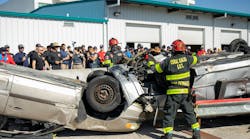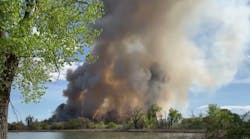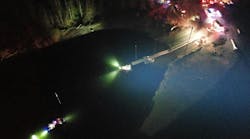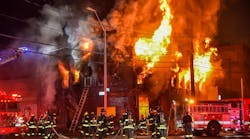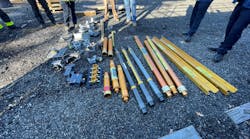Here is a question for all of you out there that are a member of a HazMat Team or a HazMat Instructor (or both). How many times have you come across someone, either on the line or in one of your classes that says something like "I'd like to join HazMat but..."? Sound familiar? What have some of their reasons been? They're no good at chemistry? They could never get into a Level A suit? They're not smart enough? The list goes on and on. These are all valid concerns on their part, but they are also wrong. That said, just what kind of qualities does it take to be a successful member of a HazMat Team?
The following are just some of the qualities, abilities and attributes that are required for membership on a Hazardous Materials Team:
Team Player Attitude - While the fire service is based on crews and teamwork, this is especially important on a HazMat Team. You simply can't be on the Entry Team all the time getting your picture in the paper. There are too many other areas that need to be staffed, such as Decon, Research, Back-Up Team, Logistics, etc. No one can do it all on their own, regardless of what they think. The ideal HazMat Technician fits in with the rest of the team, follows the chain of command as opposed to freelancing and is ready, willing and able to get in, get dirty and get the job done, regardless of their assigned task.
Willingness To Learn - It is impossible to know everything about all facets of a HazMat response. The field is simply too large and complex. Know-It-Alls tend to know less than they think they do and may end up getting someone hurt, or worse. Don't make this mistake and assume you know everything just because you just received your HazMat Technician certification.
Science / Technical Background - You certainly don't have to be a PhD in Organic Chemistry to be on a HazMat Team, but some knowledge of chemistry is desirable. This can be a coursework background in high school or college chemistry or a Chemistry of Hazardous Materials course. Lab experience certainly isn't a requirement, but it helps to know what might happen if Chemical A mixes with Chemical B.
Pride - A HazMat Team is a Special Team, like a USAR or Dive Rescue Team. A person should be able to take pride in their unit and their equipment. If a firefighter can take care of a regular Engine Company and its equipment, why should we expect them to care about a HazMat Unit and all of its equipment when the truck is usually bigger and the amount of equipment is so much larger? The answer is we can't and they won't, so they have no business being on a HazMat Team. This doesn't imply that the HazMat Technician is an egotist, just someone who takes care of their unit and equipment.
Dedication - The HazMat Team member must be dedicated to the Team. This means going above and beyond just being a regular firefighter. In many departments, the HazMat Team is not a dedicated unit, but staffed by firefighters who respond to everyday emergencies as well. This additional duty may or may not result in additional compensation. This means training on HazMat topics in addition to Fire/Rescue topics. In order to maintain proficiency in all areas, this often means training at nights and on weekends. Only those dedicated to the program will go above and beyond in order to succeed.
Analytical - HazMat incidents don't always fit the norm. What do we do if we have a leak that none of our kits can patch? What happens when Plan A fails and Plan B isn't working like it should? The ideal Technician doesn't panic, but steps back, takes an analytical approach by looking at the entire incident and comes up with a solution by thinking outside of the box.
Experience - A HazMat Team is no place for a rookie just out of Recruit School. A HazMat incident often requires split second decisions made under extreme pressure. While the same can be said about a fire ground, a HazMat Technician should gain this decision making experience on the fire ground and then transfer into a HazMat Team. The experience gained prior to joining HazMat provides discipline, sound judgment and maturity.
Commitment - A tour on HazMat is not like a tour on a line company. It takes several years to gain the necessary training and skills to be a competent HazMat Technician. HazMat should not be viewed as a means to promotion or for padding a resume. You should join HazMat because you want to, not because you have to in order to satisfy your ascent up the chain of command. You should figure on a five year commitment if you desire to become a well-rounded HazMat Responder.
Self-Motivated - The best HazMat Technicians are those that are self-motivated and disciplined. Don't wait for a Company Officer or Senior Technician to begin a class on a piece of equipment. You should be ready to go to the truck, pull equipment off of the truck and familiarize yourself with it on your own. The same applies to coursework and other training. Take advantage of the opportunities that are out there in terms of classes, both online and practical.
Planning & Management Abilities - Many HazMat Technicians will progress and become HazMat Officers. You should be able to handle the planning and management of training and equipment programs as they relate to the HazMat Team. This can be much more involved than the planning and management for a line company given the increased training requirements and larger equipment caches.
Mechanical Skill - HazMat is not firefighting. Mechanical aptitude is a definite asset due to the tools we use (chlorine kits, Vetter bags, etc.). Can you work with tools? Are you good with your hands? Can you patch a leak totally by feel? Are you creative enough to design a solution using the tools at your disposal in cases where you don't "the right tool for the right job"?
Computer Skill - Can you navigate through a computer database in order to perform chemical research? Can you input the data in order to plot a plume and interpret the map that the program produces?
Calm, Cool & Collected - HazMat Teams, like other specialty teams, are called upon to handle the incidents that line companies cannot due to the special training and equipment that are required. These incidents are generally of a higher profile than a routine dwelling fire. For this reason, a HazMat Technician must be able to remain cool under pressure, maintain the ability to function and be able to direct non-Technician personnel in assisting the HazMat Team in defensive and support functions.
Claustrophobia Concerns - A HazMat Technician may have to perform offensive functions in Level A PPE. A potential Technician needs to be made aware of this up front. Working in Level A is nothing like working in structural firefighting gear or even Level B PPE. Some people are able to work in Level A with no difficulties, some with few difficulties and others not at all. The potential Technician needs to recognize their limitations and be up front about them with the rest of the Team. It is quite possible that through time, training and familiarization, some people will be able to work through their concerns and be able to be fully functional while wearing Level A PPE.
Communications Skills - A HazMat Technician must be able to adequately portray what they have seen and done in the Hot Zone. This communication may be verbally, via radio or face to face. It may also be drawn in the form of a diagram of the area in question. The communication may also be in the form of hand signals in areas where noise prevents verbal communication or where the radio fails, forcing the use of alternative means of communication. Writing skills are also important in order to document the incident in after action and cost recovery reports. Remember, if you didn't write it down, it didn't happen. Verbal communication skills may also be valuable should the Technician be required to testify about their actions in a civil or criminal proceeding relating to the incident.
Jack of all Trades - It helps if the Technician knows a little about a lot of things as opposed being an expert on just one. A working knowledge of chemistry, plumbing, electricity, carpentry, computers, carpentry, etc. will provide a knowledge base to draw from during those times when you are confronted by a situation that wasn't exactly covered in the last course you took.
These are just a few of the qualities that are preferred in a new HazMat Technician. It doesn't take a chemical engineer, chemistry major or rocket scientist to be a HazMat Technician. What is does take is commitment, dedication and a willingness to learn. Don't let the lack of a chemical background or a failed attempt at Chemistry 101 in college stop you from joining a HazMat Team. Go ahead and give it a try. It just may turn out to be one of the best moves you'll ever make in your career.
